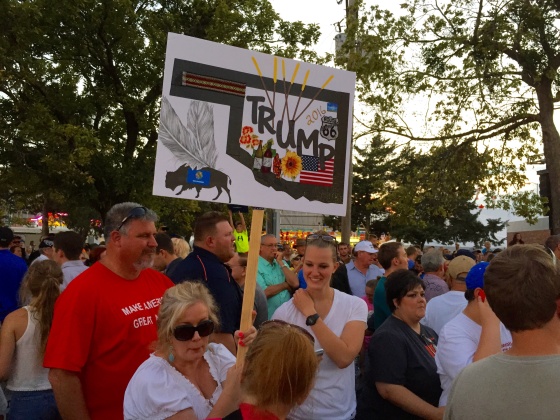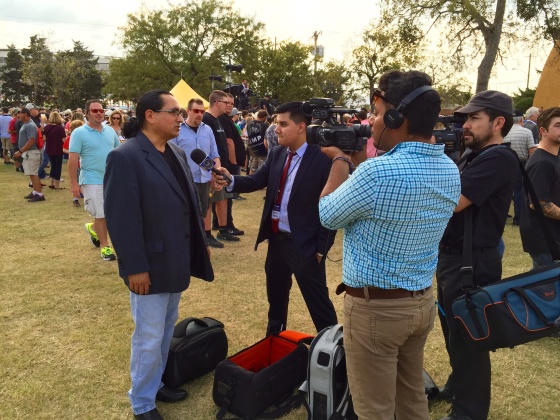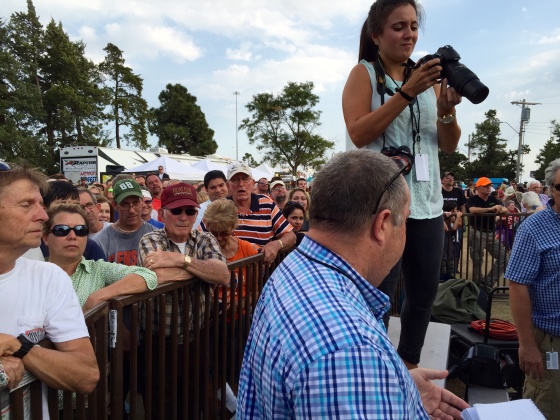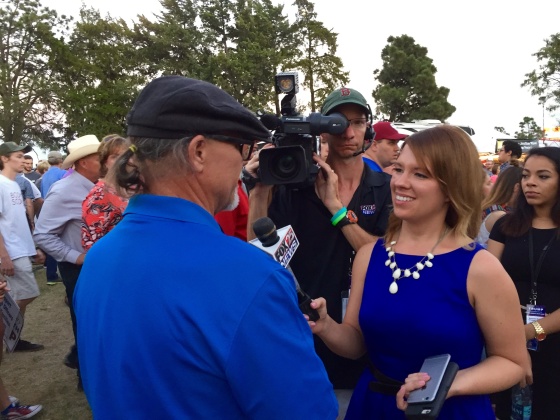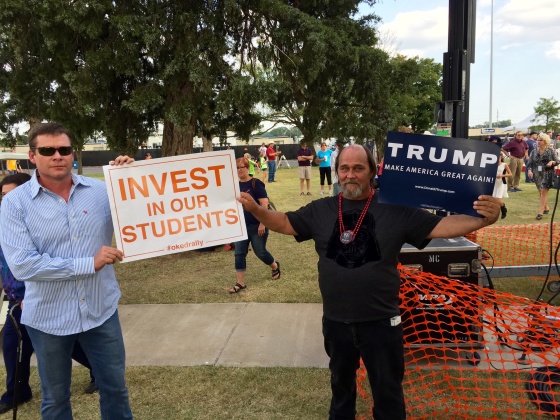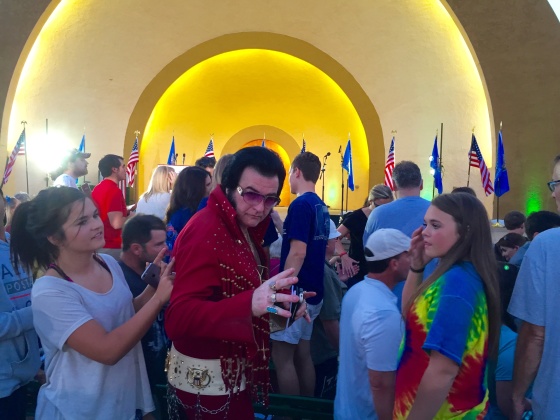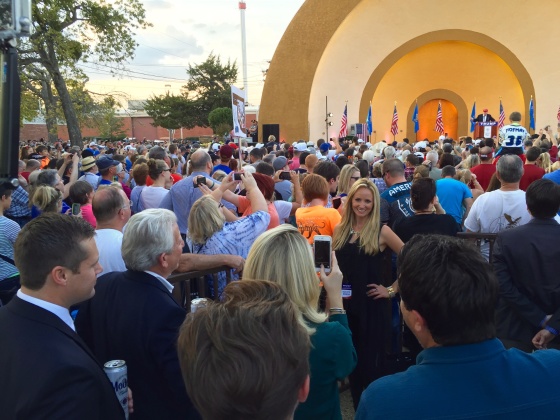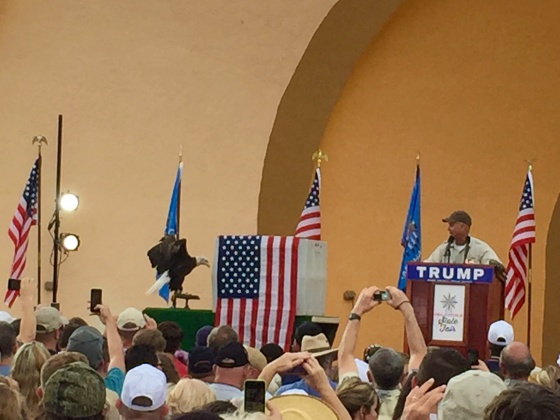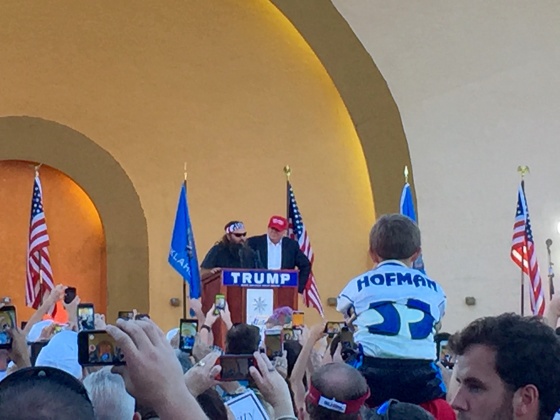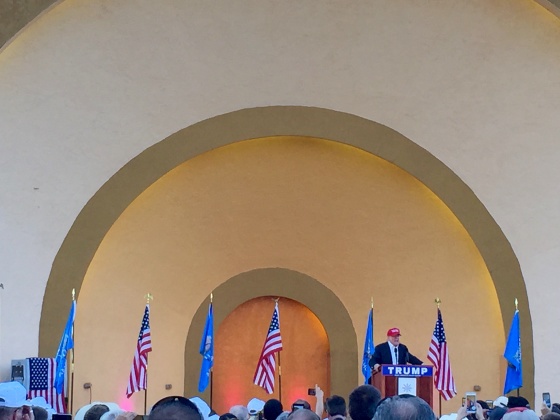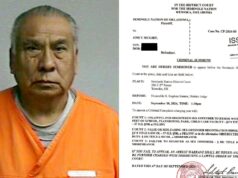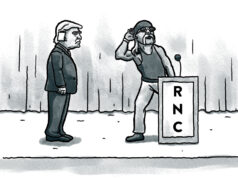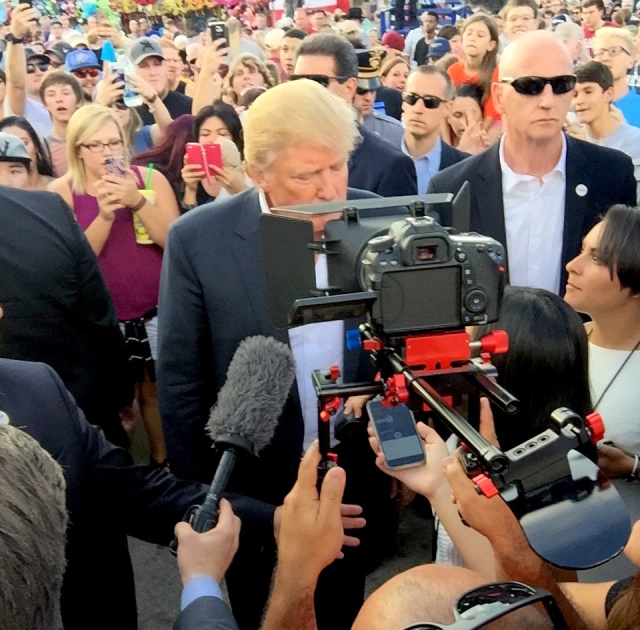

As I stood scrawling notes next to a dozen television cameras, Donald Trump told upwards of 3,000 people at the Oklahoma State Fair his opinion of the press: “They are terrible people.”
“Not all of them,” he clarified. “Just most of them.”
The 2016 GOP presidential primary front-runner has learned to clarify his remarks over the past three months on the campaign trail, and he spent more than an hour Friday proving his brand of fierce political fortitude can stay “on message” better than it once could.
That’s good news for Trump’s throng of supporters. “On message” is a term that wins campaigns. “Off message” results in bloopers or gaffs and does not.
Trump has drawn critical headlines — and even 30-odd protesters at the corner of Northwest 10th Street and May Avenue on Friday — for his crass rhetoric on illegal immigration and other policy topics. But the billionaire reality-TV star has also built an enormous following in a crowded Republican primary that has seen other candidates struggle for sustained traction.
“He’s a lightweight,” Trump said of fellow candidate Sen. Marco Rubio (R-Florida). “He can’t even pay his own credit cards.”
Trump’s sharp and often-befuddling pot shots have not only discombobulated candidates on stage at two primary debates, but they have earned him the respect of blue-collar Americans who appreciate a direct talker.
“You’re damn right I do,” said Tuskahoma professional fundraiser Justin Jackson when asked if he supports Trump and his blunt-speaking ways. “We have a man who can’t be bought. People call him an idiot or a clown, but I don’t see many idiots or clowns making $1 million a day.”
Charles Shaw — a machinery operator from Eufaula — chimed in: “There you go.”
Shaw stood for hours prior to Trump’s speech holding one sign supporting the New York Republican and another demanding better education funding in Oklahoma. The dichotomy was peculiar, but honest.
“I think he’ll invest in students and invest in America,” Shaw said. “Something needs to be done on immigration. It’s starting to affect every neighborhood in America.”
The question of illegal immigration still dominates many Trump headlines, and it continues to draw raucous support for the mogul. While it’s hard to ignore racial undertones that sometimes swirl around the words of Trump supporters, much of their frustration centers around the job market and the economy, even if they don’t love Latinos personally.
This is where Trump’s billion-dollar brand seems to seal the deal for so many. He clearly knows how to make money, and he’s not a polished milquetoast politician who will capitulate easily to a Corporate America willing to ship jobs overseas to China or across the border to Mexico.
‘On message’
Trump’s message is roughly this:
- America has some real challenges.
- There’s a lot of morons in the corporate-political class.
- I’m pretty smart and well connected.
- Look at these rubes I have for political opponents.
In introducing the candidate, local Trump co-chairman Sen. Ralph Shortey (R-OKC) reminded the state-fair crowd that surging Republican candidate Carly Fiorina is reportedly coming to Oklahoma next week.
“She’s coming for a private meeting with a bunch of oil executives,” the south-OKC senator charged.
Trump, Shortey countered in a fit of populist pride, was here to address the blue-collar masses at the fairgrounds.
“Yeah, but it costs $10 to get in!” a man screamed at Shortey from behind my post in the press section. We were surrounded by strange folk, but a look in the mirror — as Trump begged us “terrible people” to take — showed just how strange the Political Journalist really is.
‘Terrible’ people?
In the media-cattle pen, anchors in dresses stood on briefcases, and photographers on tables were accosted by attendees for blocking views.
Local videographers on cable-network contracts were trampled and prodded by one another during the candidate’s walk-up. Several of us tweeted frantically in varying degrees of pointlessness, and I simply felt accomplished for riding a hashtag coattail to the best night of Twitter jabbering my stupid thumbs have ever concocted.
A national reporter who had covered Trump on the stump before grew petrified and borderline angry when I suggested I might quote her observations anonymously.
Staring at, laughing with and even ribbing one’s fellow journalistic beasts has long been the best way to endure hours of political bloviation. It’s easy enough to tune back in when the candidate says something attention-grabbing.
“What the hell is wrong with that?” Trump asked rhetorically about something he’d been criticized for saying. My ears perked up.
Any journalist who has worked with me knows my policy on four-letter words: If a source cusses, put it in a quote.
Friday, The Donald seemed to want to make my job easy, dropping the word “hell” eight times after I started counting, likely a presidential stump speech record.
“ISIS is cutting off heads, and (Jeb) Bush says to me and Hillary Clinton says to me, ‘We don’t like your tone.'”
Trump’s oration meanders but stays effective. It rarely bores, even over an hour’s time.
“Where the hell is CNN?”
“Where the hell is Willie (Robertson)?”
“I have Carl Icahn. I’ll say, Carl, congratulations, you take China.”
While all Trump supporters I spoke with praised the candidate’s straightforward attitude and independence, all Trump criticisms I heard centered around his lack of ideas.
“I haven’t heard anything substantial,” one veteran reporter told me offhand.
Considering how Trump’s economic message had thousands of people nodding along, I realized I was hearing differently.
For instance, Trump engaged in a long hypothetical situation Friday about how Ford Motor Company announced in April that it would build a new $2.5 billion transmission plant in Mexico. To me, the scenario epitomized Trump’s appeal and his deft understanding of what makes average Americans tick.
“What the hell are we getting out of that?” he asked of Ford’s plan to a chorus of cheers.
Trump explained how candidates like Bush, Clinton, Fiorina and others would all owe major favors to the people and companies donating millions of dollars to their campaigns and Super PACs.
“Can I be honest? They’re all interchangeable,” Trump lampooned. “I’m a self-funder. I’m putting up my own money. I feel like an idiot. I’m turning down millions of dollars (in donations).”
Trump said he — and only he — would actually hold leverage over a company like Ford instead of vice versa. He said he would demand Ford build the plant in America or face a new “35 percent tax on every truck that you bring into the U.S.”
The crowd went bananas.
“I love the way he speaks his mind,” said Gloria Hunt of Tulsa, who had traveled the turnpike to see her candidate of choice. Hunt’s husband is a veteran of the U.S. Navy, and Trump made sure to recognize retired military members in the crowd.
“They’re being treated like third-class citizens,” he said.
While Trump’s military credentials are as thin as the hair on his head, no one else still running for president in 2016 has any experience either, save long-shot U.S. Sen. Lindsey “Stinkball” Graham, (R-South Carolina).
And therein lies Trump’s opportunity amid a field of otherwise uninspiring stuffed suits. He’s brash and cocky and very successful. He doesn’t take guff, and he doesn’t take lobbyist money.
In a state that’s likely about to lose scores of oil jobs — maybe as soon as next week — the billionaire businessman says he will fix this country, and many working-class optimists see him as their best hope.
If you don’t believe me, just take a listen to the song Justin Jackson wrote and is passing around.
“The Trump Train will make America great again.”
If The Donald turns out to be right, I guess by extension I really am a terrible person.









